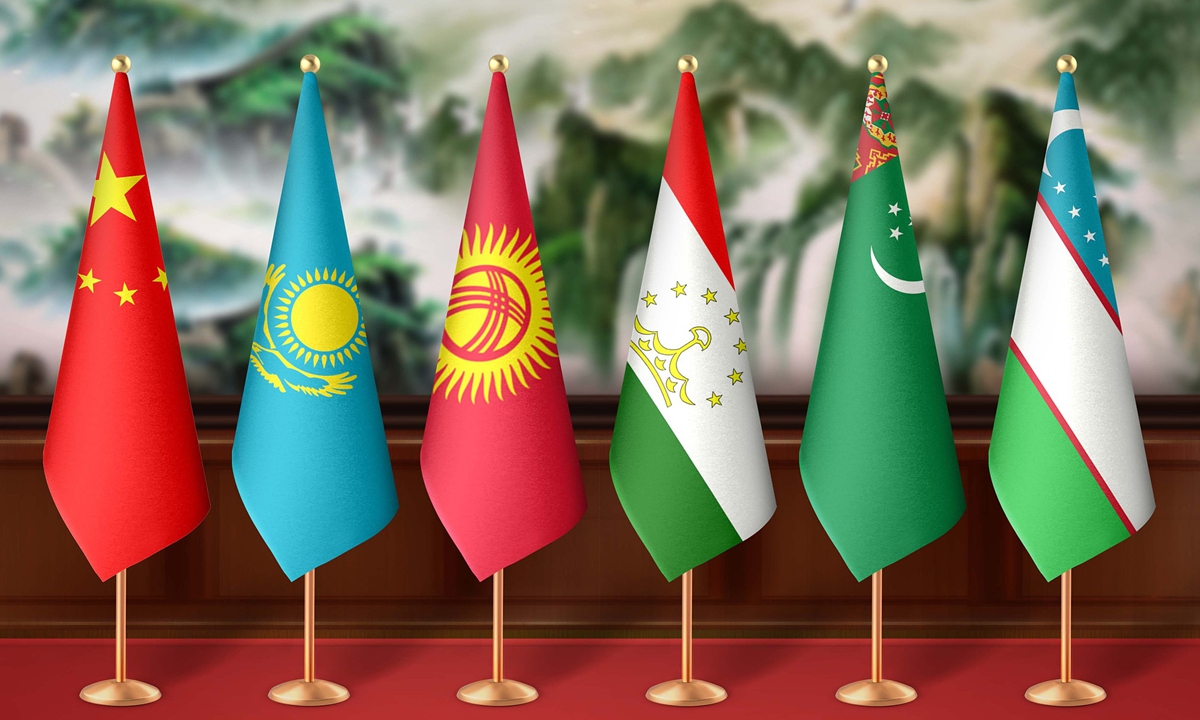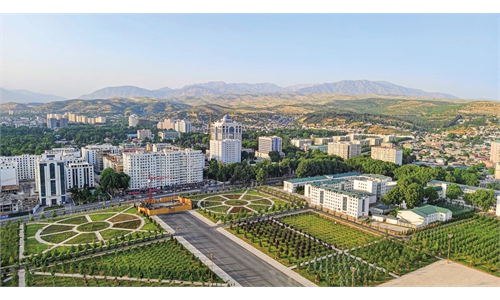China, Central Asia paint new picture of future for intl relations: Global Times editorial

Photo: CFP
On Friday local time, Chinese President Xi Jinping held talks with Tajik President Emomali Rahmon in Dushanbe, capital of Tajikistan. As the last stop of President Xi's Central Asia tour, Tajikistan extended a grand and sincere welcome, fully demonstrating the depth and solidity of the friendly relations between the two countries as good neighbors who help each other, good friends who support each other, good partners with mutual benefit and win-win results, and good brothers who treat each other with absolute sincerity.President Xi visited Dushanbe after attending the 24th Meeting of the Council of Heads of State of the Shanghai Cooperation Organisation (SCO) and a state visit to Kazakhstan. During this trip to Central Asia, Xi met with leaders of SCO member states, including Central Asian countries, delivered a series of important speeches, and achieved many important consensuses and results. He witnessed the historic moment of the development of the SCO and promoted further close interaction in China's relations with Central Asian countries. He has demonstrated to the region and the world China's firm belief in cooperating with Central Asian countries and other SCO member states for development and China's determination to further deepen good-neighborly relations, writing glorious new chapters in the country's diplomatic history.
The history of China's interaction with Central Asian countries, including Kazakhstan and Tajikistan, goes back thousands of years, and it is a precious friendship that lasts for generations. In recent decades, despite the changing international environment, China and Central Asian countries have continued to deepen their political mutual trust, and their relations have maintained a healthy and stable development momentum. They have successfully paved the way for the development of China's relations with its neighbors, and continued to write this thousand-year history.
The relationship between China and Central Asian countries is truly based on mutual respect and trust - it does not rely on any "alliance treaty" or need to establish a "rival" or involve coercion or compulsion. It is precisely because of this premise and foundation that China's relations with Central Asian countries have always been rock-solid, showing each other firm support on issues of independence, sovereignty, territorial integrity and other core interests, along with respect for each other's development paths in accordance with their own national conditions, and with resolute opposition to interference in their internal affairs by any force under any pretext. Such a genuine political mutual trust based on equality and mutual respect has also removed obstacles to cooperation.
"The goal of both sides is very grand but also simple, which is to deliver a better life for their people," said President Xi during his meeting with Uzbek President Shavkat Mirziyoyev on Wednesday before the SCO summit. This speaks to the true meaning of the development of friendly relations between China and Central Asian countries in various fields.
Currently, China and Central Asian countries have achieved "three comprehensive coverages": full coverage of comprehensive strategic partnerships, full coverage of practicing the community with a shared future for mankind on a bilateral level, and full coverage of signing cooperation documents for jointly building the Belt and Road Initiative (BRI). According to relevant data, by the end of 2023, the trade volume between China and the five Central Asian countries reached $89.4 billion, an increase of 27 percent from 2022. Within the framework of the BRI, many major cooperative projects in infrastructure, agriculture, and energy have been implemented, such as the Kapshagay photovoltaic power station in Almaty and the modernization project of the Shymkent Oil Refinery in Kazakhstan. In Tajikistan, a series of iconic large-scale cooperation projects like the Dushanbe No.2 power plant have provided impetus for the country's economic and social development and improvement of living standards. In Uzbekistan, work on the Olympic City project, which is being built by China, is in full swing.
Some media describe the frequent exchanges between the peoples of China and Central Asian countries as being akin to visiting relatives. Neighboring countries should indeed interact like neighbors, deepening mutual trust and sharing in adversity through friendly relations. Currently, China and the five Central Asian countries have established around 70 pairs of sister provinces and cities, over 10 Confucius Institutes have been set up in Central Asia, and Luban Workshops have provided significant talent support for local development. The China-Kazakhstan visa exemption agreement has officially come into effect, greatly facilitating the movement of people between the two countries. During his visit to Kazakhstan, Xi said that the Chinese side will hold a China tourism year in Kazakhstan in 2025, and has also decided to open the second Luban Workshop in the Central Asian country. The connections between China and Central Asian countries will be passed on to the next generation through various ties.
More than 100 years ago, Halford John Mackinder, a founding father of geopolitics, proposed the theory that Central Asia is located at the "heart of the World Island." Today, the relationship between China and Central Asian countries outlines a new picture for the present and future of international relations: What would a lastingly peaceful, universally secure, jointly prosperous, open and inclusive, clean and beautiful world look like, when it is free from geopolitical conflicts and the real risks of "small yard, high fence"? China and Central Asian countries are striving toward this goal, bringing vision and hope.
Now in Central Asia, the China-Europe Railway Express runs smoothly, investment and trade are booming, and cultural exchanges are flourishing. Guided by head-of-state diplomacy, the future of China-Central Asia cooperation is promising and full of potential. "Five fingers form a fist, united as one." Following the four principles that hold the key to the success of our cooperation, namely mutual respect, good neighborly friendship, solidarity in trying times, and mutual benefit, China and Central Asian countries will jointly create a brighter future.



